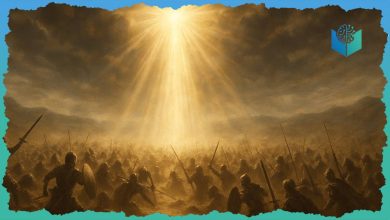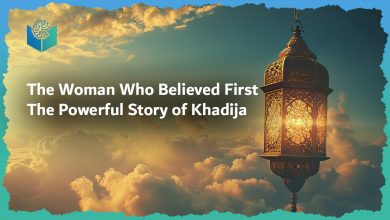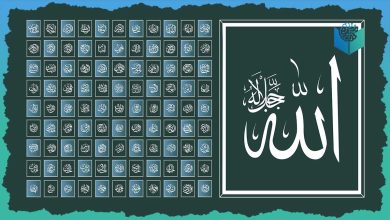The Concept of God in Islam

The Concept of God in Islam is the very cornerstone of the faith, centering on the absolute oneness, uniqueness, and supreme authority of Allah. Unlike many other religions that may conceive of God in human-like terms or as part of a trinity, Islam presents a meticulously defined and uncompromising monotheistic understanding of the Divine. Allah, the Arabic word for God, is not merely a name but an encompassing term for the singular, all-powerful, and all-merciful Creator and Sustainer of the universe. This article delves into the profound nature of God in Islam, explaining Tawhid (that God is One), His wonderful qualities, and how these core beliefs about God truly shape how every Muslim sees the world and lives each day, giving us deep insights into Islam.
Tawhid: The Absolute Oneness of God
The most fundamental doctrine in Islam is Tawhid, which asserts the absolute unity and indivisibility of God. This concept forms the very essence of Monotheism in Islam, distinguishing it sharply from polytheistic or trinitarian beliefs.
Uniqueness and Indivisibility
Tawhid means that Allah is one, unique, and has no partners, equals, or rivals in His divinity or dominion.
- No Partners or Associates: The Quran explicitly rejects any notion of multiplicity in God. “Say, ‘He is Allah, [who is] One, Allah, the Eternal Refuge. He has not begotten, nor was He begotten, And there is none comparable to Him.'” (Quran 112:1-4, Surah Al-Ikhlas). This short but powerful chapter succinctly defines the oneness of God in Islam, emphasizing His absolute singularity. It asserts that Allah is self-sufficient, without offspring or parents, existing eternally without beginning or end.
- No Division or Anthropomorphism: The Islamic concept of God also means that Allah cannot be divided into parts or attributed with human characteristics (like needing rest, having a physical form, or being born). Such attributes would limit His perfection and contradict His absolute transcendence. This strict rejection of anthropomorphism ensures that worship is directed purely towards the utterly unique and incomparable Creator.

The Sole Creator and Sustainer
Tawhid extends to acknowledging Allah as the sole Creator, Sustainer, and Controller of everything in existence.
- Omnipotence and Omnipresence: Allah is all-powerful (Al-Qadeer), capable of doing anything He wills. He is also ever-present by His knowledge and power, encompassing all things without being confined by space or time. This helps us better understand and remember Who is Allah as the ultimate authority and source of all creation.
- Reliance on God Alone: Because Allah is the only Creator and Sustainer, Muslims believe that all worship, supplication, and ultimate reliance should be directed solely to Him. This frees believers from superstition, fear of creation, and dependence on anything other than the Divine. This absolute reliance is a key feature of God in Islam.
The Attributes of Allah: Mercy, Justice, and Wisdom
While Allah is utterly unique and incomparable, the Quran and the traditions of About Prophet Muhammad ﷺ reveal His Attributes of Allah, allowing humanity to comprehend His perfection and majesty. These attributes are not separate entities, but rather different facets of His singular Divine Essence.
The All-Merciful and Compassionate
Two of the most frequently mentioned Attributes of Allah are Ar-Rahman (The Entirely Merciful) and Ar-Rahim (The Especially Merciful), appearing at the beginning of almost every chapter of the Quran.
- Boundless Mercy: Allah’s mercy encompasses all of His creation. It is a mercy that precedes His wrath and is manifested in countless ways – from providing sustenance and guidance to forgiving sins. Understanding this aspect of islamic beliefs about god instills hope and gratitude in believers.
- Justice with Mercy: While Allah is ultimately Just (Al-Adl), His justice is always tempered by His boundless mercy. He is Al-Ghafoor (The Forgiving) and At-Tawwab (The Acceptor of Repentance), encouraging humanity to turn to Him in humility and seek His forgiveness. This balance between justice and mercy is central to The Concept of God in Islam.

The All-Knowing and All-Wise
Allah is characterized by His perfect knowledge (Al-Aleem) and profound wisdom (Al-Hakeem), guiding all things with ultimate insight.
- Infinite Knowledge: Allah’s knowledge encompasses everything, seen and unseen, past, present, and future. Nothing escapes His awareness. This profound attribute brings comfort to believers who understand that their struggles and prayers are always known to Him.
- Perfect Wisdom: Every decree, every command, and every event that occurs is part of Allah’s perfect wisdom, even if humanity cannot fully grasp it. This fosters a deep sense of trust and acceptance (rida) of divine decree. These Attributes of Allah are not mere names, but describe His perfect nature.
The All-Powerful and Majestic
Allah is Al-Qawi (The All-Strong), Al-Aziz (The All-Mighty), and Al-Jabbar (The Compeller), showing His complete power and greatness.
- Creator and Sustainer: He is Al-Khaliq (The Creator) and Ar-Razzaq (The Provider), constantly bringing things into existence and sustaining them. His power is limitless, and nothing can diminish it.
- Sovereignty and Dominion: Allah is Al-Malik (The King) and Al-Ahad (The One), possessing ultimate sovereignty over all creation. Everything is under His control, and to Him belongs all dominion and authority.This aspect of Who is Allah highlights His ultimate power and control.
Impact of the Concept of God on Muslim Life
The profound Islamic concept of God deeply influences every facet of a Muslim’s life, from their daily routines to their moral compass and worldview.
Purpose of Life and Worship
Recognizing Allah as the sole Creator and Sustainer provides life with ultimate purpose: to worship Him alone.
- Direct Relationship: There are no intermediaries between a believer and Allah, meaning you can always speak to Him directly. Muslims supplicate directly to Him, fostering a personal and intimate relationship built on love, awe, and gratitude. This directness is a hallmark of Monotheism in Islam.
- Holistic Worship: Worship in Islam extends beyond ritual prayers to encompass all actions done with sincere intention for Allah’s sake. Every good deed, every act of kindness, every pursuit of knowledge can be an act of worship, transforming daily life into devotion. For a comprehensive understanding of this about Islam, resources like ayaat provide valuable insights.
Moral and Ethical Framework
The Attributes of Allah provide the foundation for Islamic ethics and morality.
- Justice and Fairness: Knowing that Allah is Just (Al-Adl) compels believers to strive for justice and fairness in their interactions with others.
- Mercy and Compassion: Reflecting on Allah’s boundless mercy encourages Muslims to be merciful and compassionate towards all beings, embodying the divine attributes in their own character.
- Patience and Perseverance: Belief in Allah’s wisdom and control fosters patience (sabr) during trials, knowing that every difficulty is part of His divine plan and purpose, much like the prophets of god exemplified throughout their lives.

Peace, Hope, and Contentment
Understanding The Concept of God in Islam brings profound peace, hope, and contentment to the heart.
- Freedom from Anxiety: By entrusting all affairs to Allah, believers find relief from anxiety and despair, knowing that He is the ultimate disposer of all matters. This deep sense of tawakkul (reliance on God) brings tranquility.
- Gratitude and Optimism: A constant awareness of Allah’s blessings and His merciful attributes cultivates a deep sense of gratitude, leading to an optimistic outlook on life, even amidst challenges. This belief in divine providence is central to islamic beliefs about god.
Conclusion
The Concept of God in Islam is an unwavering declaration of absolute Tawhid – the pure and uncompromising oneness of God in Islam. Allah is revealed as the One, incomparable, eternal Creator, whose Attributes of Allah like Mercy, Justice, Wisdom, and Power define His perfect essence. This profound understanding of Who is Allah shapes every aspect of a Muslim’s existence, providing ultimate purpose, a robust moral framework, and a deep sense of peace and reliance. It calls humanity to a direct, personal relationship with the Divine, free from intermediaries and idolatry. By meditating upon these core islamic beliefs about god, individuals find not only guidance but also solace and strength, recognizing that all existence emanates from and returns to the One True God. This singular devotion is the very heartbeat of about Islam.
Q&A
Are God and Allah the same?
Yes, Allah is simply the Arabic word for God. It refers to the same singular God worshipped by Christians and Jews, though the specific theological understanding of God's nature differs among these faiths.
Does Allah forgive all sins?
Yes, Allah can forgive all sins, no matter how great, if a person sincerely repents before death. However, the one sin Allah does not forgive if a person dies without repenting from it is shirk (associating partners with God).





